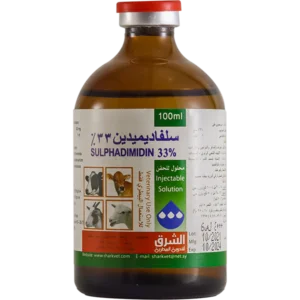Dosage Form
Injection
Group
Antimicrobial
Sulphadimidine Injection Veterinary 33%
Indications
Sulphadimidine Injection Veterinary 33% is used for cows, sheep, goats, poultry, and Rabbits to treat: pneumonia & broncho-pneumoniasis post- partum infections, septicemia, staphyl-ococcus infection & coccidiosis.
Usage and Dosage
I.M and slow I.V injection.
Large animals:15-30ml/100kg b.w
Small animals: 12-24ml/50 kg b.w
(Treatment period 3-5 days)
Withdrawal Period
For meat: 8 days
for milk: 3 days
Useful Links
en.wikipedia.org/wiki/Sulfadimidine [^]
Composition:
Useful info
The difference between antibiotics and sulfa compounds?
What are bacteria?
Bacteria are single-celled organisms that do not contain a nucleus. Bacteria live everywhere and reproduce quickly. Some bacteria are beneficial, such as those that help digest food or produce antibiotics. Some bacteria are harmful, such as those that cause various infections or diseases.
The similarity between antibiotics and sulfa compounds
We use both antibiotics and sulfa compounds to treat diseases caused by bacteria, but each has its own field and method of action, and because of this similarity, many people are confused about distinguishing between them.
What are sulfonamides ex: Sulphadimidine Injection Veterinary 33%?
Sulfa compounds, more precisely sulfanilamides, are a group of organic compounds derived from sulfanilamide, discovered in 19321. Sulfa compounds work to prevent the growth and reproduction of bacteria by inhibiting an enzyme that helps synthesize folic acid, which is necessary for the formation of bacterial DNA.
Sulfa compounds are used to treat some bacterial diseases, such as urinary tract infections, wounds, burns, abscesses, and meningitis1
What are antibiotics?
Antibiotics are medicines used to kill or inhibit the growth of bacteria that cause infections and diseases. Antibiotics are produced from microorganisms or synthetic or semi-synthetic compounds. Usually, antibiotics do not affect viruses, fungi, or parasites.
There are different types of antibiotics that target different bacterial strains. Some antibiotics are broad-spectrum and work on a wide range of bacteria, such as amoxicillin. While some antibiotics work effectively on only a few types of bacteria, such as penicillin.
Antibiotics work by different mechanisms, such as destroying the bacterial cell wall, inhibiting the production of proteins, altering the cell membrane, or inhibiting DNA cleavage².
Antibiotics are used to treat or prevent serious and acute bacterial infections, such as sore throat or food poisoning. It is also used for people with low immunity, chronic patients or the elderly. It is also used before some surgeries to prevent wound infection.
Antibiotics may cause some side effects, such as stomach upset, allergies, or fungi. It may also lead to bacteria becoming resistant to antibiotics if used incorrectly or in excess. Therefore, you must follow the instructions of your doctor and pharmacist when using antibiotics.
So, the difference between sulfa compounds ex: Sulphadimidine Injection Veterinary 33% and antibiotics is in the composition, mechanism of action, spectrum and use. While they both eliminate bacteria, but in different ways. Both of them may cause side effects, allergies, or resistance in some patients, so a doctor should be consulted before using them.





